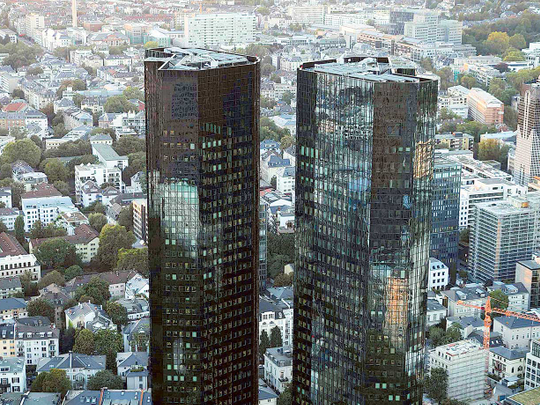
Abu Dhabi: While investor sentiment in the UAE is taking a hit on the back of mounting challenges facing Germany’s Deutsche Bank, analysts said there is no direct impact on the UAE’s markets — at least not yet.
The German lender’s share prices have been plunging lately, touching a record low of €9.9 (Dh40) in late September, with prices in the year-to-date period down over 45 per cent. The decline was supported by hedge funds pulling their investments out of the bank.
“I think the effects should be limited in our market. I don’t think the question of Deutsche Bank should affect the banking sector, with the exception being if any bank has exposure to Deutsche Bank because it’s one of the biggest banks and one of the biggest derivatives traders in the world, so probably a lot of UAE banks do trade with Deutsche especially in fixed income and derivatives.
What we’re still hearing is that Deutsche is solid, it’s liquid, and now that they’re negotiating a new settlement with the US Department of Justice, there should be less pressure on the bank,” said Mohammed Yasin, managing director of National Bank of Abu Dhabi Securities.
In early October, in the first trade session in the UAE post the Deutsche sell-off, the main indices in Dubai and Abu Dhabi were down nearly 2 per cent each. That was also supported by the UK’s announcement it would trigger Article 50 in the first quarter of 2017, and more importantly, questions about Saudi Arabia-US ties amid the 9/11 bill.
Vijay Harpalani, fund manager at Al Mal Capital in Dubai, said it was too early to read into the potential impact of Deutsche Bank on the region.
“In an unlikely event of failure in a major European bank, the risk would be more systematic in nature. On a positive note, local banks could benefit in the event on international banks shrinking their local operations,” he said.
Harpalani said, for now, investor sentiment is weak in the GCC, although that may change if Opec’s decision to freeze production yields any major positive outcome.
Similarly, NBAD’s Yasin said it’s news related to the Brexit, Saudi ties with the US, and geopolitics that will act as catalysts in UAE markets rather than news out of Deutsche Bank, which is not yet a cause of great concern.
Reassurance from analysts and even the bank’s chief executive earlier this week that there are enough assets and capital to stop it from going bankrupt have also helped ease worries.
However, it would be an entirely different scenario — even in UAE markets — should Deutsche’s financial performance deteriorate or should challenges keep mounting.
“Deutsche Bank really is a huge institution, and if the question of its continuity or failure is on the table, the impact will be huge on international market and it will have an impact on appetite for risk,” Yasin said, adding that the failure of a bank the size of Deutsche could even usher in another financial crisis.
He added, “I’d say if we close the year in the same range where we’ve been trading for the past four months — and by that I mean ADX would be up about 3 per cent for the year and DFM is up about 10 per cent — I think we should be happy with this outcome even though traded values have dropped 28 per cent on average compared to last year.”










